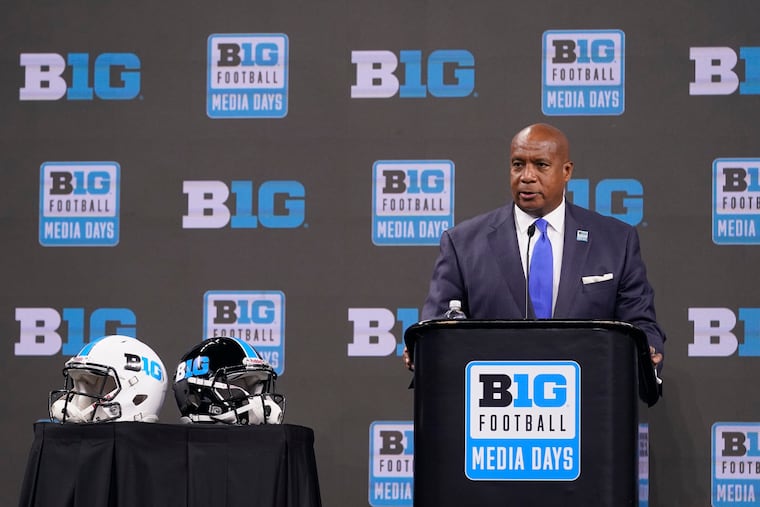With the addition of UCLA and USC, the Big Ten is a network, not a conference
“We’ll be able to provide content from morning all the way into the night,” said Big Ten commissioner Kevin Warren.

INDIANAPOLIS — At this point, the Big Ten is more network than conference.
If you look at UCLA and USC deciding to join the party from that angle, how can you argue against it?
“We’ll be able to provide content from morning all the way into the night,” Big Ten commissioner Kevin Warren said Tuesday opening the first of the conference’s two football media days at Lucas Oil Stadium, live on the Big Ten Network. (Please stand up and ask your question … hey, this is a television show.)
Let’s note for the record that very smart people set up the Big Ten Network itself. They saw the future, including how so much of it would be online. They later understood why Rutgers, for instance, brought geographic value beyond wins or losses. They paid more than lip service to gender equity in setting up the network.
The conference’s beloved academic sheen is not hurt by UCLA or USC joining. That just doesn’t happen to be what this expansion is about.
“The key decision this time was Kevin Warren’s decision to have Fox in the room for all media discussions approaching the contract expiration,” said Penn adjunct assistant professor of higher education Karen Weaver, academic director of a Penn certificate program for senior leaders in college athletics.
» READ MORE: Total realignment chaos could help Temple. Hello, ACC?
A former college coach and athletic director, Weaver wrote her Ph.D dissertation on the formation of the Big Ten Network, in which the conference partners with Fox on the ownership.
“If you want to add something techy, you can thank the 1996 Telecommunications Act for creating bandwidth for regional sports networks,” Weaver said. So noted. As the world changed, the Big Ten has never chosen to be left behind.
Of course, the Big Ten’s TV money doesn’t just come in from the Big Ten Network. The over-air TV contract rights are up for grabs right now. What a coincidence that the nation’s second-largest television market provides the new schools.
Other than opening the door if Notre Dame knocks, you can believe Warren when he says, “We will not expand just to expand.” (Oregon probably would move to Idaho to get in.) But let’s also believe the Big Ten very much likes to be ahead of this game.
As Big Ten moves go, this one seems as big as adding Penn State in 1990, taking the Big Ten past 10 institutions. Each subsequent expansion, to Nebraska, and then Maryland and Rutgers, expanded the conference’s footprint to a new state, but only to a state that bordered an existing Big Ten state. There had been no following the Atlantic Coast Conference, which had jumped over five states to add Boston College.
This move — heading out 1,500 miles from Nebraska’s campus to UCLA and USC — is a staggering one to claim a presence in the four largest television markets. None of the other Power 5 conferences would be in any of them.
For another example of how important all this is to the Big Ten, Warren said he isn’t just in favor of college football playoff expansion but “multiple media partners” for it. In other words, enough for ESPN and Fox to both cash in.
Originally, as Weaver’s dissertation notes in detail, the Big Ten got pretty far down the road negotiating with Comcast to partner on the Big Ten Network before the money and cable clearances made more sense with Fox as its partner. A fruitful one for both sides, with the Big Ten schools having the foresight to throw their lot in together, when the powerhouses previously had their own separate local deals.
One more sign of the current evolution, a press release showed up Monday titled, “Big Ten Conference and Big Ten Network establish Big Ten Corporate Partnerships to lead league-league sponsorships and activations.”
“Having a powerful presence in the three largest media markets, New York, Chicago, and Los Angeles, the BTCP team will deliver a breadth of innovative, strategic, and holistic corporate sponsorships and partner activations,” Warren said in the press release. (Yo, Commish, Philly is fourth. Good thing we don’t get offended easily.)
There were no press conference questions for Warren about the sponsorship plan. Lots of topics already were up for grabs, including revenue sharing for players. A reporter was in from Los Angeles to ask if UCLA and USC would be full earning members as soon as they joined. That’s a yes, Warren said.
“They bring a lot of value to our relationship,” he said. “They bring a lot of panache to our relationship. And we look forward to welcoming them into the Big Ten family here in 2024.”
Warren talked for 45 minutes, until 11 a.m. It was 10:58, time for one more question … oops, nope, the commissioner was done, time for a commercial.
» READ MORE: Do Title IX and NIL play well together? Some urge caution.